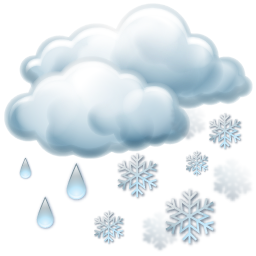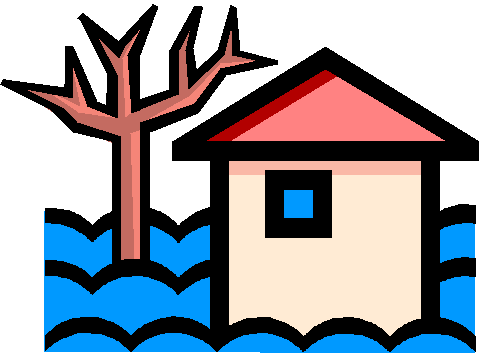Natural Disaster
Whether the emergency is natural or manmade, it is prudent for a community to be prepared. The Department of Homeland Security has put together a list of suggestions for building your own Emergency Supply Kit. Click on the preceding link to see what's recommended.
Winter Weather
 At some point during the winter residents of this district may be faced with severe winter weather. Weather can include freezing rain, subzero temperatures, and blizzard conditions accompanied by strong winds and heavy snow. Of primary concern is the winter weather's ability to knock out heat, power, or communications lines to your home or office, for an extended amount of time. The following are steps you can take to help prepare you for extended winter weather:
At some point during the winter residents of this district may be faced with severe winter weather. Weather can include freezing rain, subzero temperatures, and blizzard conditions accompanied by strong winds and heavy snow. Of primary concern is the winter weather's ability to knock out heat, power, or communications lines to your home or office, for an extended amount of time. The following are steps you can take to help prepare you for extended winter weather:
-
Make sure your home is well insulated and that you have weather stripping around your doors and window sills to keep the warm air inside.
-
Thoroughly check and update your family's Emergency Supply Kit before winter approaches.
-
Include adequate clothing and blankets to keep you warm.
-
If you have a car, keep the gas tank filled in case you have to leave.
-
Plan to stay inside and make it on your own, at least for a period of time.
-
If you have a wood burning fireplace, consider storing wood to keep you warm if winter weather knocks out your heat.
-
Listen to NOAA Weather Radio to stay informed of winter weather watches and warnings.
- Keep in mind that during a severe winter storm it could be hours, or even days, before emergency personnel are able to reach you.
Floods
 While flooding events are not as common in the northeast as they are in other parts of the country, they do occur none-the-less. Be prepared for flooding no matter where you live, but particularly if you are in a low-lying area, near water or downstream from a dam. Even a very small stream or dry creek bed can overflow and create flooding. Here are some things you can do to prevent damage before a flood occurs:
While flooding events are not as common in the northeast as they are in other parts of the country, they do occur none-the-less. Be prepared for flooding no matter where you live, but particularly if you are in a low-lying area, near water or downstream from a dam. Even a very small stream or dry creek bed can overflow and create flooding. Here are some things you can do to prevent damage before a flood occurs:
-
Elevate the furnace, water heater, and electric panel in your home if you live in an area that has a high flood risk.
-
Consider installing "check valves" to prevent flood water from backing up into the drains of your home.
-
If feasible, construct barriers to stop floodwater from entering the building and seal walls in basements with waterproofing compounds.
-
Get a kit of emergency supplies and prepare a portable kit in case you have to evacuate.
-
If you have a car, keep at least a half tank of gas in it at all times in case you need to evacuate.
After a flood occurs:
-
Do not walk through moving water, if possible. Look for areas where the water is not moving. What might seem like a small amount of moving water can easily knock you down.
-
Do not drive into flooded areas. If your vehicle becomes surrounded by rising water, get out quickly and move to higher ground, if possible.
-
Click here for information on cleanup after the flood.
For more information on preparing for other natural or man made disasters visit the United States Department of Homeland Security's web site Ready.Gov
Hurricanes
 A hurricane is a giant tropical storm that originates in the southern Atlantic Ocean. It spirals counter clockwise and draws heat from the warm, moist southern Atlantic Ocean air. As it travels, it releases the heat and moisture in the form of condensation through thunderstorms. These thunderstorms bring very high winds and heavy torrential rains that in some cases can also spawn tornadoes. Many times, the torrential rains cause further damage in the form of floods and landslides.
A hurricane is a giant tropical storm that originates in the southern Atlantic Ocean. It spirals counter clockwise and draws heat from the warm, moist southern Atlantic Ocean air. As it travels, it releases the heat and moisture in the form of condensation through thunderstorms. These thunderstorms bring very high winds and heavy torrential rains that in some cases can also spawn tornadoes. Many times, the torrential rains cause further damage in the form of floods and landslides.
The Following is information courtesy of FEMA and the American Red Cross
Preparing for a hurricane
Preparing for a hurricane is very much like preparing for any other natural disaster, with the following added precautions:
- Make plans to secure your property. Permanent storm shutters offer the best protection for windows. A second option is to board up windows with 5/8” marine plywood, cut to fit and ready to install. Tape does not prevent windows from breaking.
- Install straps or additional clips to securely fasten your roof to the frame structure. This will reduce roof damage.
- Be sure trees and shrubs around your home are well trimmed.
- Clear loose and clogged rain gutters and downspouts.
See FEMA's "How To" guides for protecting your property high wind, And because hurricanes can cause flooding follow the guidance in the section above for flooding.
During a Hurricane
- Listen to the radio or TV for information.
- Turn off utilities if instructed to do so. Otherwise, turn the refrigerator thermostat to its coldest setting and keep its doors closed.
- Turn off propane tanks.· Avoid using the phone, except for serious emergencies.
- Ensure a supply of water for sanitary purposes such as cleaning and flushing toilets. Fill the bathtub and other large containers with water.
You should evacuate under the following conditions:
- If you are directed by local authorities to do so. Be sure to follow their instructions.
- If you live in a mobile home or temporary structure—such shelters are particularly hazardous during hurricanes no matter how well fastened to the ground.
- If you live on the coast, on a floodplain, near a river, or on an inland waterway.
- If you feel you are in danger.
If you are unable to evacuate, go to your safe room. If you do not have one, follow these guidelines:
- Stay indoors during the hurricane and away from windows and glass doors.
- Close all interior doors—secure and brace external doors.
- Keep curtains and blinds closed. Do not be fooled if there is a lull; it could be the eye of the storm - winds will pick up again.
- Take refuge in a small interior room, closet, or hallway on the lowest level.
- Lie on the floor under a table or another sturdy object.
After the Hurricane
Recovering from a disaster is usually a gradual process. Safety is a primary issue, as are mental and physical well-being. If assistance is available, knowing how to access it makes the process faster and less stressful. This section offers some general advice on steps to take after disaster strikes in order to begin getting your home, your community, and your life back to normal.
- Continue listening to a NOAA Weather Radio or the local news for the latest updates.
- Stay alert for extended rainfall and subsequent flooding even after the hurricane or tropical storm has ended.
- If you evacuated, return home only when officials say it is safe.
- Drive only if necessary and avoid flooded roads and washed-out bridges.
- Keep away from loose or dangling power lines and report them immediately to the power company.
- Stay out of any building that has water around it.
- Inspect your home for damage. Take pictures of damage, both of the building and its contents, for insurance
purposes. - Use flashlights in the dark. Do NOT use candles.
- Avoid drinking or preparing food with tap water until you are sure it’s not contaminated.
- Check refrigerated food for spoilage. If in doubt, throw it out.
- Wear protective clothing and be cautious when cleaning up to avoid injury.
- Watch animals closely and keep them under your direct control.
- Use the telephone only for emergency calls.
Click on the links below for further Information:
Download the American Red Cross Hurricane Safety Checklist (Spanish)
Download the Food and Water Safety During Hurricanes, Power Outages, and Floods
Dealing with Private Drinking Water Wells After a Flood
CT DEP's Household Garbage & Storm Debris
After the Disaster: A Guide for Residents and Small Businesses About Managing Debris Waste